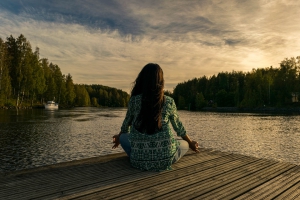It’s a Matter of Perspectives by Elianne Kremer, Israel
Six months after I arrived to Israel, I was living in Jerusalem and the terrorist attacks began. I didn’t really understand what was going on. People were afraid, it was possible to feel the discomfort in public spaces, in the bus mainly. Nobody wanted to be there, as if the expectancy of a terrorist attack happening, of violence becoming real, was the only thing present between human interactions.

This was my first emotional contact with the conflict. I started to be afraid as well. Until then I didn’t understand this feeling of fearing death, fearing for my life, on a daily basis. While my friends were speculating about when this situation will be over, those two months felt longer than many years I have lived, they were like a threshold to a new dimension. Very different from the dimension I know, coming from a place where I luckily never had to deal with this type of situations. I come from a place in the South of the world, where violence is related to poverty and delinquency, where we can more easily distance ourselves from violence because we don’t feel part of it.
I was scared to death to be a witness of violence or to be the victim of it. I think I became traumatized and paranoid. A friend told me: “this is the aim of terrorism, to generate terror among the people”. Somehow I agreed but I knew that violence is not only made up of a victim and its killer. I realized that violence is a circle. Luckily, within that period, I never had direct contact with a violent act. Once I saw blood in the street, where a terrorist attack had just occurred, another time I saw militaries detaining a guy because he looked suspicious. I understood that the oppression and discrimination of Arabs and Palestinians in Jerusalem was a trigger for their violent acts. I met the word occupation for the first time, and I understood it from its deepest roots. I decided to do something about it and, coincidentally (or not), I came across someone who combines meditation with activism, and explores the relationship between inner peace and outer peace. I started going to this group, where we did meditation and talked about how we felt in relation to the situation in the city, how we interact with and relate to the people that surround us on a daily basis. Out of the fear I felt everyday and the immense pain of being scared for my life, I found a meaning in trying to improve myself.
I was invited to a meditation retreat in a small Palestinian village called Deir Istiya: two days living with local Palestinians, speaking to them, understanding their personal stories under a military occupation which affects their livelihoods and freedom. The aim was to bring the stories of Palestinians to Israelis that were born and raised in a system that normalizes a military service at the age of 18. I felt that for me it was easier, because I’m an outsider in a way. I’m Jewish and identify with this land. But at the same time I also don’t identify with the Army, with the fear that the government spreads so naturally or with the many ways of discrimination this country enables. We worked with the locals in their olive plantations, heard stories about their family members becoming terrorists, about landlords that were not allowed to carry any tools (e.g., knives or potential guns) and how that hindered production, commerce and welfare. There were Palestinian children there interacting and playing with us. We were hosted for dinner in the house of one of the local community members, ate a delicious Maqlooba under the moonlight, and we felt that peace was among us.
After we sat down for our meditation, it was time for sharing. One of the Israelis there said that when we were playing with the children, one of them took a stone and threatened to throw it over. He said that for him, this is a strong image and he felt scared that the child could do something violent. The facilitator of our discussion took a moment and proposed the image of a soldier in uniform, carrying an M16, imposing discipline every day of that child’s life. For the child, this is the way he is born and raised, with constant military presence. “So what is more violent?” He asked. “A boy threatening to throw a stone or the presence of an armed soldier in the lives of these people?” Since that moment, I understood that in order to approach peace, we need to broaden our perspectives.





Leave a Comment
Want to join the discussion? Feel free to contribute!